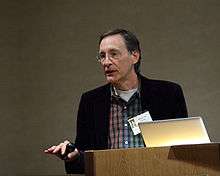Robert N. Proctor

Robert Neel Proctor (born 1954) is an American historian of science and Professor of the History of Science at Stanford University.[1] While a professor of the history of science at Pennsylvania State University in 1999, he became the first historian to testify against the tobacco industry.[2]
At Pennsylvania State University, he and his wife, Londa Schiebinger, co-directed the Science, Medicine and Technology in Culture Program for nine years. The couple met at Harvard, where they earned their master's and doctoral degrees in 1977 and 1984, respectively.[3]
He coined the term "agnotology" to describe the study of culturally induced ignorance or doubt, particularly the publication of inaccurate or misleading scientific data.[4][5]
Dr. Proctor is writing a book, "Agate Eyes: A Lapidary Journey," in which he writes about agnotology; "By contrast with diamonds or asbestos or granite or the minerals we burn for fuel, the lowly agate is the victim of scientific disinterest, the same kinds of structured apathy I have elsewhere called 'the social construction of ignorance.' Agates seem to fall outside the orbit of geological knowledge, and therefore tend to be regarded — if at all — as geological accidents or oddities not really deserving systematic study."[6]
Bibliography
- Proctor, Robert N. (1988). Racial Hygiene: Medicine Under the Nazis. Cambridge: Harvard University Press. ISBN 0-674-74578-7.
- Proctor, Robert N. (1991). Value-free Science?: Purity and Power in Modern Knowledge. Cambridge: Harvard University Press. ISBN 0-674-93170-X.
- Proctor, Robert N. (1995). Cancer Wars: How Politics Shapes What We Know and Don't Know about Cancer. New York: BasicBooks. ISBN 0-465-02756-3.
- Proctor, Robert N. (1999). The Nazi War on Cancer. Princeton, N.J.: Princeton University Press. ISBN 0-691-07051-2.
- Proctor, Robert N. (2000). Adolf Butenandt (1903-1995): Nobelpreisträger, Nationalsozialist und MPG-Präsident: Ein erster Blick in den Nachlass. Berlin: Max-Planck-Gesellschaft zur Förderung der Wissenschaften. LCCN 2001375957.
- Proctor, Robert N. (2002) [1999]. Blitzkrieg gegen den Krebs. Gesundheit und Propaganda im Dritten Reich. Stuttgart: Klett-Cotta. ISBN 3-608-91031-X.
- Proctor, Robert N. (2012). Golden Holocaust: Origins of the Cigarette Catastrophe and the Case for Abolition. Berkeley: University of California Press. ISBN 9780520270169.
- Cross, Gary S.; Proctor, Robert N. (2014). Packaged Pleasure: How Technology and Marketing Revolutionized Desire. Chicago: University of Chicago Press. ISBN 9780226121277.
See also
References
- ↑ "Stanford History Department : Robert N. Proctor". Stanford University. Archived from the original on 2007-03-19. Retrieved 2007-08-12.
- ↑ Cohen, Patricia (2003-06-14). "History for Hire in Industry Lawsuits". New York Times. Retrieved 2007-08-12.
'The historical profession has really not been prepared for this,' said Robert N. Proctor, a professor of the history of science at the University of Pennsylvania, who in 1999 became the first historian to testify against the tobacco industry. 'We don't have disclosure rules for publications, we haven't had discussions about the ethics of whether to testify or not to testify.'
- ↑ "IRWG director hopes to create 'go to' center for gender studies". Stanford News Service. 2004-10-13. Retrieved 2007-08-12.
- ↑ Arenson, Karen W (2006-08-22). "What Organizations Don't Want to Know Can Hurt". New York Times.
'there is a lot more protectiveness than there used to be,' said Dr.Proctor, who is shaping a new field, the study of ignorance, which he calls agnotology. 'It is often safer not to know.'
- ↑ Kreye, Andrian (2007). "We Will Overcome Agnotology (The Cultural Production Of Ignorance)". The Edge World Question Center 2007. Edge Foundation. p. 6. Retrieved 2007-08-12.
This is about a society's choice between listening to science and falling prey to what Stanford science historian Robert N. Proctor calls agnotology (the cultural production of ignorance)
- ↑ "The Agateer". Research Penn State. Retrieved 2012-08-07.
External links
- The Agateer
- Anti-Agate: The Great Diamond Hoax and the Semiprecious Stone Scam
- Nazi Medicine and Public Health Policy
- Rendez-vous with Robert Proctor
- The anti-tobacco campaign of the Nazis: a little known aspect of public health in Germany, 1933-45
- Commentary: Schairer and Schöniger's forgotten tobacco epidemiology and the Nazi quest for racial purity
- Historical Reconstruction of Tobacco and Health in the U.S., 1954-1994
- The man who studies the spread of ignorance - Gerorgina Kenyon, BBC, 6 January 2016